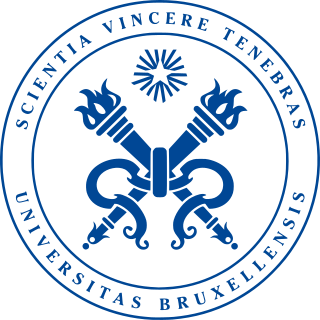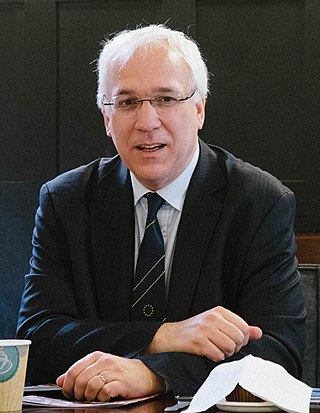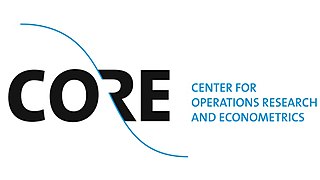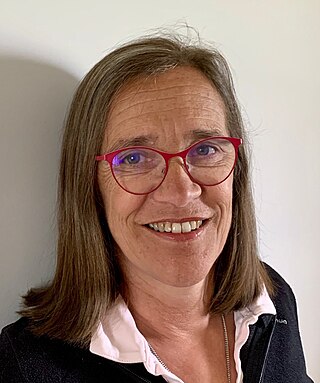
The Université libre de Bruxelles is a French-speaking research university in Brussels, Belgium. ULB is one of the two institutions tracing their origins to the Free University of Brussels, founded in 1834 by the lawyer and liberal politician Pierre-Théodore Verhaegen.

Philippe Van Parijs is a Belgian political philosopher and political economist, best known as a proponent and main defender of the concept of an unconditional basic income and for the first systematic treatment of linguistic justice.

The University of Liège, or ULiège, is a major public university of the French Community of Belgium founded in 1817 and based in Liège, Wallonia, Belgium. Its official language is French.
The Francqui Prize is a prestigious Belgian scholarly and scientific prize named after Émile Francqui. Normally annually since 1933, the Francqui Foundation awards it in recognition of the achievements of a scholar or scientist, who at the start of the year still had to be under 50. It currently represents a sum of 250,000 Euros and is awarded in the following three-year rotation of subjects: exact sciences, social sciences or humanities, and biological or medical sciences.
The Belgian American Educational Foundation (BAEF) is an educational charity. It supports the exchange of university students, scientists and scholars between the United States and Belgium. The foundation fosters the higher education of deserving Belgians and Americans through its exchange-fellowship program. Since 1977, Dr. Emile Boulpaep is the president of the BAEF.
The National Fund for Scientific Research (NFSR) was once a government institution in Belgium for supporting scientific research until it was split into two separate organizations:

Émile Francqui was a Belgian soldier, diplomat, businessman and philanthropist.
Pierre Macq was a Belgian physicist who was the rector of the University of Louvain (UCLouvain) from 1986 until 1995. In 1973, he was awarded the Francqui Prize on Exact Sciences for his work on experimental nuclear physics.

François, Baron Englert is a Belgian theoretical physicist and 2013 Nobel Prize laureate.

The Belgian University Foundation was founded in 1920. The goal of the Foundation, as was put forward by Emile Francqui, is to promote scientific activity at Belgian universities.

Jean-Luc Brédas is an American chemist, working at the University of Arizona. He was born in Fraire, Belgium, on 23 May 1954.

Marc, Baron Henneaux is a Belgian theoretical physicist and professor at the Université Libre de Bruxelles (ULB) who was born in Brussels on 5 March 1955.
Éric Remacle was a Belgian scientist and professor at the Department of Political Sciences of the Universite Libre de Bruxelles (ULB). In 2000, together with Paul Magnette, he was awarded the Exceptional Francqui Prize for European Research.
The Artois-Baillet Latour Foundation is a Belgian non-profit organization which was founded on 1 March 1974.
Axel Cleeremans is a Research Director with the National Fund for Scientific Research (Belgium) and a professor of cognitive science with the Department of Psychology of the Université Libre de Bruxelles, Brussels.

Esther Duflo Banerjee, FBA is a French–American economist who is the Abdul Latif Jameel Professor of Poverty Alleviation and Development Economics at the Massachusetts Institute of Technology (MIT).

Jan Maria Florent Wouters is a Belgian academic. He is Jean Monnet Chair, and Professor of International Law and International Organizations at KU Leuven, where he is also Director of its Centre for Global Governance Studies and Institute for International Law.

The Center for Operations Research and Econometrics (CORE) is an interdisciplinary research institute of the University of Louvain (UCLouvain) located in Louvain-la-Neuve, Belgium. Since 2010, it is part of the Louvain Institute of Data Analysis and Modeling in economics and statistics (LIDAM), along with the Institute for Economic and Social Research (IRES), Louvain Finance (LFIN) and the Institute of Statistics, Biostatistics and Actuarial Sciences (ISBA).

Conny Clara Aerts, born 26 January 1966, is a Belgian (Flemish) professor in astrophysics. She specialises in asteroseismology. She is associated with KU Leuven and Radboud University, where she leads the Chair in the Astroseismology group. In 2012, she became the first woman to be awarded the Francqui Prize in the category of Science & Technology. In 2022, she became the third woman to be awarded the Kavli Prize in Astrophysics for her work in asteroseismology.

Isabelle Thomas is a professor of geography at the Université Catholique de Louvain in Belgium and research director of the National Fund for Scientific Research. She is member of the Center for Operations Research and Econometrics (CORE)












